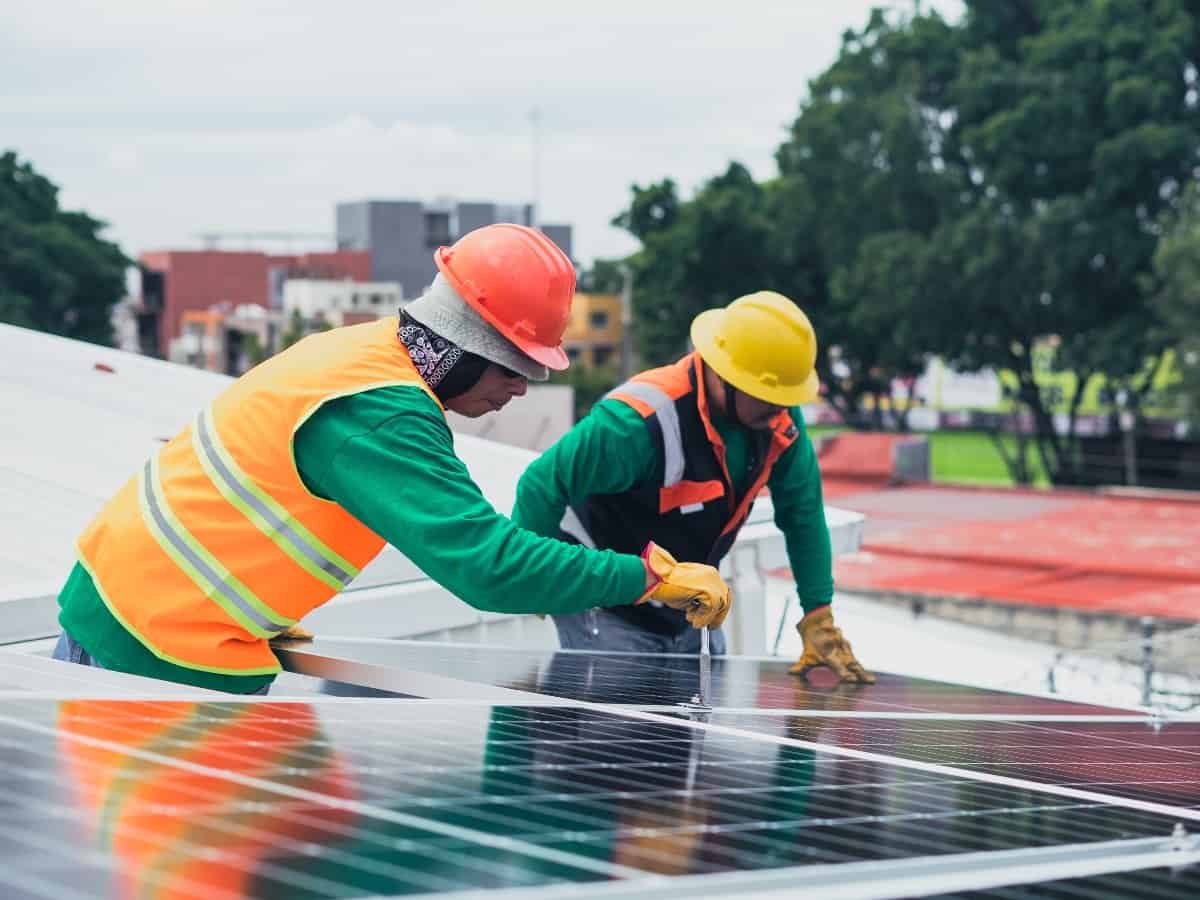There are some questions homeowners ask themselves when it comes to solar energy. The most common being: Is solar energy becoming cheaper? The other one is: Why are solar panels so expensive?
For the past 10 years, solar energy has gotten dramatically cheaper, which is why it has become a lot more common among homeowners. If you are wondering why solar panels are expensive, you need to compare the current price with that of 2010 or further.
With a little research, you’ll discover the cost of solar energy is becoming cheaper, and the price will continue to drop in the future. In this article, we’ll let you know how you can save with solar panels and common myths about solar energy. Read on to find out more.
Discover Energy Audits with Solar Energy and ONIT Home
Try our Free Energy Audit to make sure your home is performing at optimum energy efficiency. We’ll inspect every nook and cranny of your home to make sure it’s best serving your needs. We’ll also give you tips on lowering your energy bills, conserving energy, and creating a more efficient space. To learn more about how we can help you maintain a top performing home, visit us online to get started!
Myth #1: Solar Energy Is Too Expensive
Unlike what most people believe, solar energy can save you a lot of money. On average, families can expect to save $100 a month on electricity with solar. While solar panels’ installation was a bit expensive a few years ago, the cost has drastically fallen. A little over a decade ago, solar panels were costing $1 per kilowatt hour. Meanwhile, coal and natural gas were costing on average around 4-5 cents per kilowatt hour.
Fast-forward to modern day, and solar panels are now 4 cents per kilowatt hour. This price reduction stems from energy production improvements. There are also more solar energy companies working hard to provide cheaper alternative energy solutions for families. And then you have local solar incentives brought about to encourage more families to switch to solar. These are usually as a sizable solar tax credit that you get to enjoy for choosing to go green. Right now, the incentive is 26% of the total cost to install solar panels at home. This will drop to 22% in 2021. Overall, the drastic price reduction for solar panels and the generous tax credits makes solar panels suitable for both industrial and home use.

Other Common Myths About Solar Energy
There are several other myths and misconceptions about solar energy. These myths are the reason some homeowners ask: Why are solar panels so expensive? Here are a few things that aren’t true about solar energy.
Myths Related to Ease-of-Use
- Requires a Lot of Maintenance. Once you install a residential solar system, that’s it. The system requires little maintenance because it doesn’t have any moving parts. You will only need to carry out annual cleaning to remove dirt from the panels.
- Doesn’t Work in Cold Climates. Did you know that conductivity increases in cold temperatures? Well, most solar panels work best in both cold and sunny conditions. Cold conditions make the flow of electricity more efficient compared to higher temperatures.
- Have a Complicated Installation Process. This depends largely on who installs your solar power system. When you stick with the experts, like the folks at ONIT, you can rest easy knowing our team is working fast but efficiently to ensure you can quickly enjoy the benefits of clean energy.
- Useless at Night. Although solar arrays may not produce energy at night, the panel’s energy during the day can run throughout the night. Batteries are effective in the storage of additional solar electricity for later use.
Myths Related to Return-on-Investment
- Can’t Use Excess Energy. Some people believe that solar panels can’t store excess energy. However, this is not true. If you have a solar power battery, you can use this device to store away excess energy. With solar panels on your home, you can also utilize net metering. This sends any excess energy your panels produce to your utility company, which pays you for it in return. The payment will be based on the going rate for electricity in your area. If you need to use this energy, such as after the sun sets, the utility company will send it your way.
- Lower Property Value. This is simply not true. Solar panels can actually increase your property value by an estimate of 4.1%. This will vary depending on where you live in the United States.
- Cause More Pollution. Nope. Solar panels themselves don’t cause more pollution. It’s a great source for clean, renewable energy. What this myth is likely referring to is the panel’s manufacturing process. Manufacturing various components of the panels, such as the photovoltaic cells, can involve hazardous chemicals that can be problematic if they are not properly disposed of or leak. Currently, there are U.S. environmental laws overseeing how these chemicals are disposed of.
- Cause Damage to Roofs. This mostly depends on the condition of your roof. Prior to installation, it’s crucial for your solar company to inspect your roof properly. This will help determine whether your roof is compatible with a solar power system. When choosing an installation company, make sure you pick one that offers these essential services. They will protect your roof and your investment in the long run.
How to Save With Solar Panels
More and more people are considering installing solar panels and going off-grid due to the benefits that come with solar energy. Here is a list of 8 ways solar panels can help you save money.
Eliminate Energy Bills
One of the major reasons people switch to solar is to eliminate or reduce the cost of electricity. The amount of money you’ll save from solar energy will depend on your consumption and the amount of energy that your solar power system produces. Since electricity prices are continuously growing, you’ll save more in the coming years.
Secure Investment
Solar energy lets you calculate the amount of energy your panels produce. With this, you can easily figure out the total cost of energy produced.
On the other hand, the price of traditional energy fluctuates a lot. The fluctuations make it difficult for homeowners to calculate the cost of energy they are likely to use.
Earn Your Money Back
Did you know that your solar energy system can start paying for itself? Solar panels come with low payback periods. Shorter payback periods mean it won’t take long for your solar power system to start earning you money.
Currently, the payback period for solar panels is about eight years. The easiest way to determine your length of payback for the system on your home is to divide your combined solar costs with your annual financial benefits. Keep in mind that your combined costs typically include the expense of your solar power system, available solar incentives, an estimate of your household’s monthly energy use, and average electricity generation.

Add Value to Property
As mentioned earlier, other than being good for the environment, solar panels are excellent for your property value. According to Zillow’s analysis, solar panels can raise a home’s value by about 4.1%. Buyers are open to paying premiums of about $15,000 if a home has an average-sized solar system.
Other reports show that homeowners who have installed solar panels sell their homes much faster than those who haven’t installed solar panels. That means that solar panels help you save and help you earn more profit from your property.
Energy Independence
Through solar energy, homeowners and businesses become their power providers. That ensures there is energy security since you know the amount of energy your solar panels produce. There are no rising or fluctuating prices because the solar panels belong to you.
Enjoy Warranties
Warranties are an essential part of your solar installations because they offer protection to your investment. Although there are different types of warranties, most of them protect your system against premature wear and tear, environmental issues, and manufacturing defects. You are likely to receive a warranty of up to 25 years if you install a residential solar system.
Tax Credits and Rebates
To promote solar systems expansion throughout the country, utilities, governments, and other organizations provide financial incentives and solar tax breaks for homeowners. It makes solar panels readily accessible by homeowners due to reducing the solar panel system’s net cost.
For instance, the federal government provides a 30% tax deduction for homeowners who install solar panels. Moreover, homeowners are also eligible for different types of state rebates.

Enjoy Clean Energy and Money Savings With ONIT
Now that you have answers to the myth “why are solar panels so expensive,” as well as other falsehoods, know that ONIT has got you covered for all your solar panel systems. We help you save the environment and control your monthly energy bills. With our net metering system, you can be sure to save a lot of money.
Our team of experienced installers ensures that your system will be installed the right way the first time. Get in touch with us today for high-quality solar panel systems. You can also call us at 1-833-433-0331 for consultation.
ONIT’s expert team can help make your green energy goals a reality. And when you install a solar power system with ONIT Home, you can install a whole home water filtration system and smart security system for FREE with installation in two weeks. Additionally, we’re offering $1,500 in vouchers to be used with solar, water filtration, and home security. Contact us today at 1-833-433-0331 to learn how you can enjoy this special offer.



